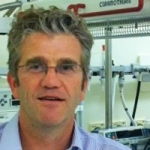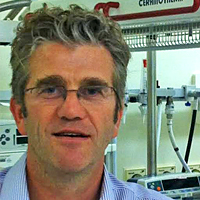 IBCLC Detailed Content Outline: Development and Nutrition Focused CERPs - Section I
IBCLC Detailed Content Outline: Development and Nutrition Focused CERPs - Section I
Access CERPs on Development and Nutrition for the IBCLC Detailed Content Outline recertification requirements. Enjoy convenient on-demand viewing of the latest Development and Nutrition focused IBCLC CERPs at your own pace.

Feeding Preterm Babies after Hospital Discharge: Breast-milk, Fortifier, Supplements and Complementary Foods

Dr Embleton has worked in neonatal medicine for the past 25 years, completing clinical training and a research doctorate in neonatal nutrition in the UK, and a neonatal fellowship in Vancouver, Canada. He has worked as a Consultant Neonatal Pediatrician in Newcastle, UK since 2002, one of the largest UK neonatal units, caring for sick preterm and term born neonates. He leads a broad portfolio of research focused on nutrition and gut health in preterm infants. Areas of work include determining patterns of early gut microbial colonization, and how these may predict the development of necrotizing enterocolitis (NEC) and sepsis. He is a project team member of large neonatal feeding trials recruiting >5000 infants in the UK, as well as coordinating mechanistic studies using microbiomic and metabolomic analyses. He chairs the multi-disciplinary UK Neonatal Nutrition Network (N3) and is a member of the Committee of Nutrition for ESPGHAN.
Topic: Probiotics in Preterm Infants - [View Abstract]
Survival in preterm infants has increased over the last few years, and this has been accompanied by an increasing focus on the importance of nutrition and the effects of preterm birth on later outcomes. Providing nutrition to sick preterm infants in the NICU is complex, and almost all preterm infants are discharged with growth outcomes (weight and length) considerably below their birth centiles. This is important because data show an association between poorer growth and nutritional status in the NICU, and worse longterm neurodevelopmental outcomes. Whilst greater efforts are required to improve nutritional status prior to discharge, the post-discharge setting represents a time period when brain growth is also rapid, and where the potential exists to improve outcome through nutritional interventions. However, the potential benefits of improved brain outcomes need to be considered alongside the possibility of metablic harm induced by excessively rapid growth which may increase risks of obesity and later chronic disease. This talk will consider the continued importance of breast milk after discharge, the potential role of fortifiers and supplements in meeting nutrient requirements, and issues around the timing of introduction of complementary foods.

View Details / Enroll

View Details / Enroll


Mihaela Nita- MD, IBCLC, medical doctor (since 2007), specialized in pediatrics and International Board Certified Lactation Consultant (since 2011), worked mainly to develop the profession of IBCLC in Romania. Organizer of the first IBCLC Day in Romania, is the co-founder and president of Romanian Lactation Consultant Association, member of ELACTA. Active in the field of lactation, organizing conferences, events, support groups, 90 hours training courses, CERPs accredited courses, fundraising events. On behalf of the Romanian Lactation Consultant Association, Mihaela Nita started the first volunteer work in the country, in the NICU of Marie Curie Emergency Children Hospital in Bucharest that led to the idea of implementing a human milk bank. Mihaela is passionate about training, advocating for the IBCLCs role and making a change for mothers, society and medical system in the field of lactation.
Romania is one of the European countries with a very low breastfeeding rate. The emergence of IBCLCs in the past 2 decades helped in improving mothers access to lactation professionals. Starting from 2013 with the first celebration of IBCLC Day, conferences and courses, the awareness of a new profession raise.
Although in Europe there are more than 200 human milk banks, Romania does not have one.
The limitations in the process of implementing a human milk bank in the NICU, the gap of legislation, the support of the civic society and 2 cases are discussed in the presentation.

View Details / Enroll

Funny Tasting Milk: The Biochemistry and Clinical Applications of Human Milk Oxidation vs. High Lipase Action

After studying biology at Meredith College in North Carolina, Nicola Singletary, PhD, MAT, IBCLC spent the early part of her career sharing her love of science with middle school students. It was not until after the birth of her first child in 2007 and the challenges she faced breastfeeding that she became interested in pursuing a career in breastfeeding support. She enrolled at North Carolina State University to study human nutrition and completed the Mary Rose Tully Training Initiative through the Carolina Global Breastfeeding Institute at UNC Chapel Hill in 2012. In the fall of 2013, she opened Harmony Lactation, LLC with the goal of helping mothers meet their breastfeeding goals. She recently completed her PhD in Nutrition and is a postdoctoral researcher at NCSU; her research focuses on breastfeeding education. She is also co-owner of Next Level Lactation, an educational and consulting company for lactation professionals.
Topic: Funny Tasting Milk: The Biochemistry and Clinical Applications of Human Milk Oxidation vs. High Lipase Action - [View Abstract]
Some breastfeeding parents find that their stored milk tastes sour or rancid, and sometimes this milk is refused by their baby. These flavors and odors are often described as metallic, fishy, rancid, sweaty or soapy. But what exactly causes these ‘off’ flavors and what can be done about milk that is refused? Is the solution always to scald milk? Milk with high lipase action leads to milk with increased levels of free fatty acids during storage that can produce rancid and sweaty flavors. Enzymes such as lipase can be inactivated by heating prior to milk storage. Milk with high levels of polyunsaturated fatty acids is susceptible to fat oxidation during storage leading to fishy and metallic flavors. Storage recommendations to reduce oxidation of fatty acids in milk include using short storage times, thawing at cold temperatures, and avoiding light exposure during storage. Case studies of both oxidized milk and high lipase action will be presented along with possible solutions.

View Details / Enroll

View Details / Enroll


Carmela is a family medicine MD, bachelor´s degree in Public Health Education, and IBCLC since 2005. She is also a BFHI Evaluator and the co founder and past president of the Spanish Lactation Consultant Association (AECCLM). She works in a private Family Wellness Clinic, Raices, as person in charge of the lactation program, which includes two IBCLCs attending breastfeeding families and an extensive offer of breastfeeding training for health care professionals and breastfeeding peer counsellors. The team has trained over three thousand doctors, midwives and nurses from both the Spanish National Health Service and the private sector in Spain. She is a frequent lecturer at national conferences, and has also lectured internationally, both on-site and online. She is the author of several scientific papers on breast pain, mastitis and tongue tie. She is also the author of a breastfeeding/parenting book, “Amar con los Brazos Abiertos” (To Love with Open Arms). She is married to Carlos and they homeschool their four children.
Topic: Assessment and Management of Mastitis - [View Abstract]
Topic: Getting Milk Production off to a Good Start - [View Abstract]
Topic: Management of Chronic Breast Pain: Holistic Approach - [View Abstract]
Topic: The Art and the Science: A Critical Look at the Physiology and Management of Mastitis - [View Abstract]
The most frequent cause of weaning worldwide is mother´s feeling that she does not have enough milk or that her infant is hungry despite her efforts… and frequently this perception becomes a reality. What support systems and clinical strategies can we use to protect mother´s normal capacity for milk production?


Consultant neonatal pediatrician with special interest in neonatal nutrition, probiotics, gut-brain-microbiota axis and long-term neurodevelopment. Dr Jape leads the high-risk neonatal follow-up program for her tertiary referral institute. Currently the chair for the Perinatal Society of Australia and New Zealand long-term outcomes sub-committee. Dr Jape is Clinical Associate Professor at the School of Medicine, University of Western Australia. Dr Jape is reviewer for national and international medical journals.
Topic: Critical Congenital Heart Disease: A Guide to Screening & Management - [View Abstract]
Topic: Gut-Microbiota-Brain Axis in Neonates and Infants - [View Abstract]
Recent advances in next generation sequencing have improved our understanding of the important role of gut microbiota in influencing brain development and function; i.e: 'gut-microbiota-brain' (GMB) axis. This is a bi-directional pathway where brain and gut microbes share detailed communications through immunological pathways, hormones and metabolites. GMB plays a crucial role in early brain development and function and impacts on long-term neurodevelopment and neurobehaviour. Understanding these roles is important to understand effective management and potentially prevention. This presentation will cover important aspects of GMB development, physiology, function and translation in clinical medicine for neonates and infants.

Hold the Phone! Diet Does Matter During Breastfeeding: Implication of Diet on Fatty Acid Composition and Other Nutrients

Laurel Wilson, IBCLC, CLE, CCCE, CLD is a TEDx and international speaker, author, pregnancy and lactation expert, and consultant. She served as the Executive Director of Lactation Programs for CAPPA, the Childbirth and Postpartum Professional Association for 16 years and now is on the Senior Advisor Board. She served on the Board of Directors for the United States Breastfeeding Committee from 2016-2019. She also is on the Advisory Board for InJoy Health. She owns MotherJourney, focusing on training perinatal professionals on integrative and holistic information regarding pregnancy, childbirth, and breastfeeding. She has her degree in Maternal Child Health: Lactation Consulting and is an internationally board certified lactation consultant. As the co-author of two books, The Attachment Pregnancy and The Greatest Pregnancy Ever, original Editor of the CAPPA Lactation Educator Manual, and contributing author to Round the Circle: Doulas Talk About Themselves, she loves to blend today’s recent scientific findings with the mind/body/spirit wisdom. Laurel has been joyfully married to her husband for nearly three decades and has two wonderful grown sons, whose difficult births led her on a path towards helping emerging families create positive experiences. She believes that the journey into parenthood is a life-changing rite of passage that should be deeply honored and celebrated.
Topic: Epigenetics and Breastfeeding: The Potential Longterm Impact of Breastmilk - [View Abstract]
Topic: Hold the Phone! Diet Does Matter During Breastfeeding: Implication of Diet on Fatty Acid Composition and Other Nutrients - [View Abstract]
Topic: Postpartum Mood Disorders, Breastfeeding and the Epigenetic Links from Past Into Future - [View Abstract]
Topic: Talk To Me: How Breastmilk Acts as a Communication and Gene Expression Tool Between Mother and Child - [View Abstract]
Topic: The Milk Sharing Conundrum - The Grey Area Between Scope and Need - [View Abstract]
Topic: The Placenta and Breastmilk-Unraveling the Mysterious World of the Intelligent Organs that Protect our Babies - [View Abstract]
Topic: Understanding Zika and Lyme and Breastfeeding - [View Abstract]
Topic: Unraveling the Mysteries of Human Milk: The Fascinating Role of Neohormones, Epigenetics, the Microbiome and More! - [View Abstract]
For more than a decade most lactation professions have been suggesting to families that diet matters very little in terms of breastmilk composition. We have told parents that they can essentially eat whatever they want, it does not matter to the bottom line. However, new studies imply that in fact, diet does matter in terms of the composition of fatty acids and essential nutrients available in milk that can potentially impact life long health. Studies also show that changes in diet can lead to gene methylation which impacts gene expression, as well changing the oligosaccharide profile which shapes the microbiome. This presentation takes you on a tour of some recent research finds to better understand how maternal diet (potentially prenatally through lactation) DOES play a role in breastmilk and how a parent’s diet can potentially influence a breastfeeding baby’s health.

View Details / Enroll

How B.E.S.T. (Basic Evaluation of Structural Tension) Relates to Breast©

Judy Terwilliger is a Clinical RN Therapist with Pediatric experience for over 30 years. As lead therapist, researcher and educator in her proprietary form of functional mobility therapy (Functional Bowen™), she works with allied health care providers in the resolve of hidden structural barrier challenges for infants and children. Her collaborative, integrative team care approach sees many successes. She is committed to equipping families with the tools necessary in support of breastfeeding and enabling parents to participate in the resolve of their children’s structural challenges. She is a member of the National Society of Pediatric Nurses and was a nominee in the 2013 Clinical Excellence in Practice Award. She has been a speaker at the Northern California Placer County Breastfeeding Coalition, Imperial Valley Breastfeeding Summit and presented at the 2016 California Breastfeeding Coalition. Her professional memberships include: ABM Network, International Pediatric Integrative Medicine Network, IATP, and Breastfeeding USA. Judy is a licensed continuing education provider for the National Certification Board for Therapeutic Massage & Bodywork, California Board of Registered Nurses, The California Physical Therapy Association, and the International Board of Lactation Consultant Examiners.
This lecture/course is intended to familiarize the medical and allied health community in the recognition of the often-overlooked muscle-related structural barriers to breastfeeding. It provides a discussion of clues to the predisposing factors of these barriers and explores their affect on infant "functional mobility" as it relates to the achievement of successful breastfeeding. It is intended to improve the clinician’s assessment skills as they work with the mother/infant dyad in resolving breastfeeding difficulties/dysfunctions by development of insight into these often hidden and profoundly destructive structural manifestations. Recognition of these barriers with an emphasis on self-help techniques and when/who to refer parents/caregivers to for help, together with how to best meet their teaching/training needs across cultural barriers, is discussed. The ultimate purpose is the achievement of insight to improve the clinician’s evaluation process, better enabling them to promote, enhance and even save the breastfeeding experience of the families served.

View Details / Enroll

View Details / Enroll

How Breastfeeding and Food Allergies Intersect: What We Know and How We Can Help

Meghan McMillin holds a Master’s Degree in Human Nutrition from the University of Illinois at Chicago. She has been a Registered Dietitian Nutritionist (RDN) since 2013 and became an International Board Certified Lactation Consultant (IBCLC) in 2019.
Meghan spent 5 years working clinically in the NICU, pediatric floor and women’s units of a local hospital. In 2019, Meghan started her own private practice and consulting company, Mama & Sweet Pea Nutrition, with a focus on postpartum and infant care. The mama to two young kids with food allergies, helping other families manage food allergies, whether it’s while breastfeeding, during the introduction of solids, or later in childhood, is her passion.
Meghan is a member of the International Lactation Consultant Association and the United States Lactation Consultant Association. She enjoys sharing her knowledge through social media and public speaking. Meghan is the coauthor of the eBook What To Eat When Your Baby Can’t Tolerate Milk, Soy, or Egg Protein; Nutrition guidance for avoiding milk, soy, and/or eggs while lactating.
Meghan has presented both nationally and internationally including for GOLD learning, the National WIC Association and the Academy of Nutrition and Dietetics. In 2020, Meghan was awarded the Emerging Professional in Women's Health Award from the Women's Health Dietetic Practice Group of the Academy of Nutrition and Dietetics.
Topic: Popular Diet Trends: Impact and Safety During Lactation - [View Abstract]
Though the overall risk of the development of food allergies in infants remains very low, prevalence has been increasing. With that increase, we are also seeing more concerns for food allergies in the exclusively breast/chest fed infant. This presentation aims to educate on the different types of food allergies (IgE mediated vs non- IgE mediated) and their symptoms commonly seen in a breast/chest fed infant. We’ll review the current feeding recommendations for an infant that presents with food allergies including maternal elimination diets. This presentation will also explore the role of the lactation consultant in managing food allergies and supporting our families that face this challenging situation.

View Details / Enroll


I was born in Detroit Michigan and graduate from M.L. King High School in 2001. I completed a B.S. in Chemistry at Oakland University in Michigan and Ph.D. in Chemistry at Vanderbilt University. After completing postdoctoral research at Memorial Sloan Kettering Cancer Center, I began an independent career at Vanderbilt In 2014.
When antibiotics were first broadly introduced in the 1930s, they were considered the most important advancement in modern medicine. Deaths attributed to communicable diseases were drastically reduced leading to the belief that infectious diseases were conquerable. Bacteria, however, counter antibiotic chemotherapy with resistance mechanisms that result in the emergence of infections untreatable by the current artillery of therapeutics. Efforts to develop new antimicrobial agents with unique structural motifs and novel modes of action to fight multi-drug resistant pathogens are ongoing. During this seminar, I will discuss our groups ongoing efforts to develop human milk oligosaccharides as novel antimicrobial agents.

View Details / Enroll


Dr. Jessie Young is a Pediatric Chiropractor near Olympia Washington who works closely with other healthcare professionals to provide comprehensive and collaborative care. She has specialized education in treating breastfeeding difficulties and is near completion of her IBCLC certification. As part of a family's health care team, Dr. Young helps resolve musculoskeletal issues causing breastfeeding difficulties including neck tension, TMJ dysfunction, torticollis, and painful latch. She also provides pre and post-frenotomy care for musculoskeletal issues contributing to tethered oral tissue. Providers, parents and patients rely on Dr. Young for her comprehensive diagnostic and treatment approaches, including modified chiropractic adjustments, myofascial release, therapeutic exercise, and craniosacral techniques. Dr. Young currently volunteers to promote literature contributions and advancement as the Research Chair for the American Chiropractic Association Council on Chiropractic Pediatrics.
Identifying musculoskeletal issues that can impact breastfeeding is an important component of proper management. When surveyed, IBCLCs reported that half were not comfortable identifying musculoskeletal issues .Referrals for musculoskeletal problems were thus hypothesized to be delayed as a result of this discomfort. It was recommended that lactation professionals could benefit from more specialized training in identifying musculoskeletal issues, as early intervention for breastfeeding difficulties is a critical determinant in success.
Attendees will be able to take away the skills and tools to better identify musculoskeletal problems, the indications for co-management/referral and the safety and effectiveness of manual therapy for suboptimal breastfeeding . Issues such as TMJ dysfunction, postural asymmetry, cranial asymmetry, myofascial and joint restrictions commonly cause suboptimal breastfeeding. Current literature supports the fact that favorable outcomes are probable when these issues are treated with manual therapy. Thus the timely identification, referral, and resolution of musculoskeletal issues is one factor that can contribute to the resolution of breastfeeding difficulties.

View Details / Enroll



















